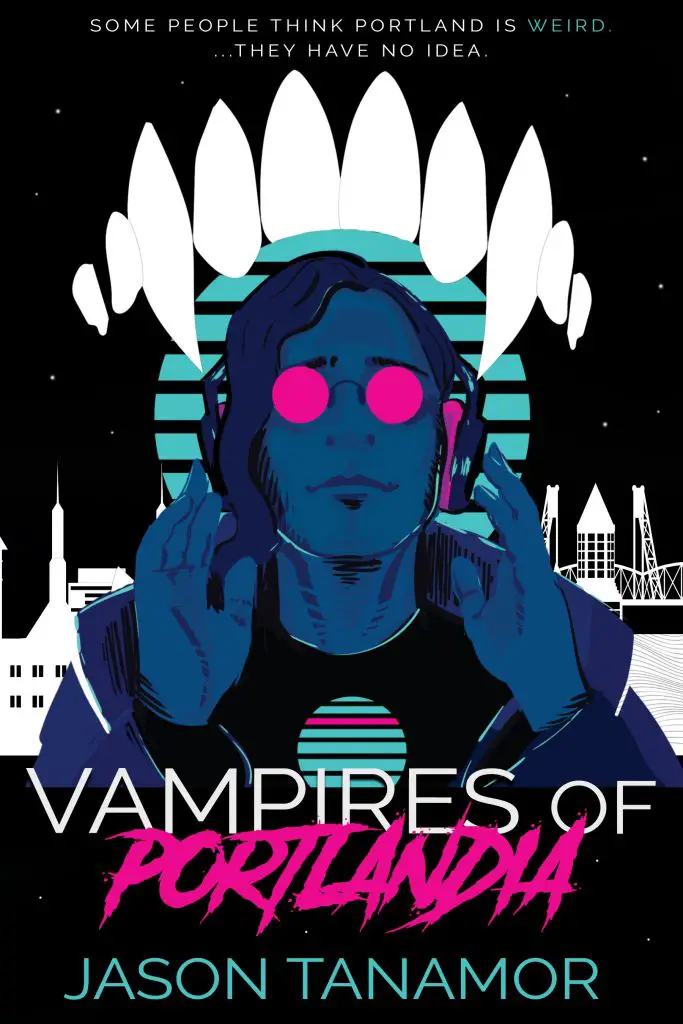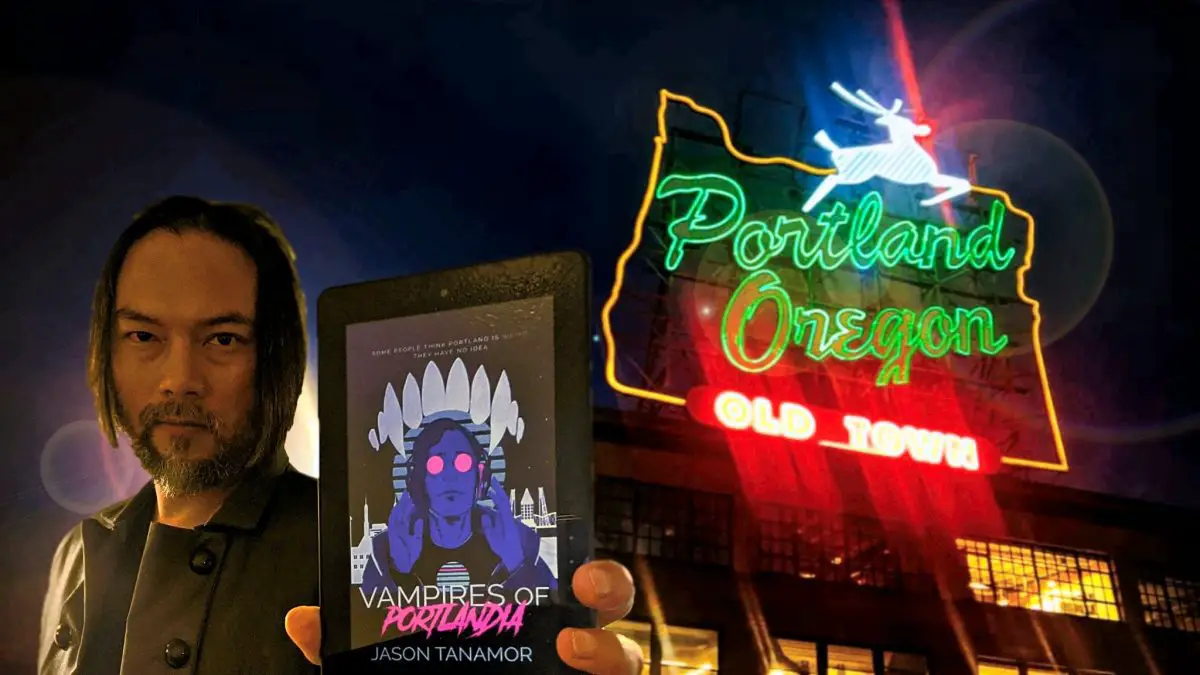What's a good read?
Gully Book’s Author in Spotlight this month is Jason Tanamor. Jason is an American author, writer and entertainment interviewer of Filipino decent. His newest novel, Vampires of Portlandia, is an urban fantasy.
Get to know more about Jason from our short interview below.
How about a little background about yourself (i.e., where you’re from, your education, family life, etc.)?
I am currently living and working in Portland, Oregon. I hold two bachelor degrees – accounting and communications – and have been married for 14 years. My wife and I are both from the Iowa/Illinois area, and have relocated to the West Coast for jobs. My immediate family – two brothers and parents – still live in my hometown. I have only met a handful of real relatives (majority of blood related are in the Philippines) and grew up with other Filipino families as “relatives.”
What is the title of your latest book, and what is it about?

Vampires of Portlandia is based on Filipino folklore – aswangs, which means shape shifter. There are five different breeds of aswangs – vampires, viscera, werebeasts, ghouls, and witches. In the Philippines, aswangs are like the boogieman. It’s a story that elders tell their children and grandchildren to scare them. I’d never heard of it growing up. One day, I was watching the TV show, “Grimm,” and one of the episodes revolved around aswangs. I’d called my father and he gave me the background, but I don’t think he believed the lore because he was very casual about his response. I slowly became fascinated with the subject.
The novel is about a family of aswang vampires that flees the Philippines for Portland, Oregon for a peaceful life. In the book, the Philippine government is trying to rid the country of aswangs, to keep the country pure. So the vampires relocate to Portland, Oregon because the city reminds them of the little mountain town they’d left behind.
Readers can expect a fun, quirky, somewhat creepy, and epic read.
Are there characters in your books that you based on real people?
A lot of the characters’ traits are ones that either I possess (Percival), or other Filipinos that I know possess. The brother, Roger, is sort of like my son. The young twin, Geena, is like my niece when she was the same age. The rest of the characters are homogenized versions of Filipinos that I know. As a Filipino-American who grew up in the United States, having the novel set in America made it easier to write. The challenge was blending the Philippines world with the Portland world, joining them cohesively while keeping them distinct from one another.
How did you come up with the title?
I’d originally thought the book should be titled Aswangs of Portlandia because it introduces each breed, but the term aswang wasn’t, in my opinion, widely recognized. Since the story focuses primarily on the vampires, it soon became Vampires of Portlandia. As for Portlandia, with the show’s success and several niche companies using the name to refer to Portland, the title sounded more intriguing than “Vampires of Portland.”
Who designed the cover?
The cover concept/design is 100% the publisher, Shayne. She brought two ideas to me, both of which I loved in very different ways. When I’d decided which cover to go with, we worked together to tweak. In the end, I’d widened Percival’s nose so it was more Filipino and defined the cityscape more so Portland was more recognizable.
Can you tell us something about your book’s genre?
Technically, this falls into new adult, urban fantasy, but I think the book will resonate with young adults and adults, as well, who have a fascination with vampire culture and folklore like “Grimm” and “Supernatural.” Notice I referenced television shows, as I wrote the book as a visual, scene by scene, as a viewer would digest it.
What type of genre does it fall into?
I’d like to think it’s more a pop culture novel than solely urban fantasy.
Where will your book be available, and how much is it?
The book releases on September 29th in both paperback ($14.99) and digital ($6.99) formats. An audiobook is in the works as well. We’re auditioning narrators as we speak.
Have you written/published anything, not in the same genre?
Yes! I don’t typically stick to one genre; rather I enjoy many different genres and write what I would enjoy reading. With Vampires of Portlandia, I wanted to write a book about Filipino aswang with the same spirit of my favorite movie, The Lost Boys. The movie was like a horror and comedy mashed together. There were dark moments mixed in with lighthearted fun and campy humor. Other books I’ve written derive from something completely different.
Is there anything you find particularly challenging in your writing?
I love coming up with the general idea, plot twists, and concept of the story. I hate writing the first draft. I always struggle with that. Subsequent drafts are much more tolerable, but nothing can compare to that moment you go from wondering what in the hell you’re going to write, to having a story playing in your mind. It’s magical.
When and why did you begin writing?
I’ve always wanted to be an author, but never really thought I could. As an American born Filipino, with immigrant parents, my priority was going to college to be something practical—like an accountant! So I didn’t get serious with writing until after I’d graduated from college.
But, even then, I still didn’t focus on novel writing. I spent a long time writing for media, for sites like Yahoo!, where I would interview celebrities such as Fight Club author Chuck Palahniuk, comedian Dane Cook, Red Hot Chili Peppers, Billy Corgan (Smashing Pumpkins), and baseball legend, Pete Rose.
That took up a lot of time, so novel writing was secondary. After I’d expended myself, I quit the media to focus on writing novels. But writing novels takes discipline, and luckily for me, I maintain a strict routine. I make time early in the morning to write. I don’t set any word count goals as my sessions generally begin at or around 3:30 am and end on or around 5:00 am during weekdays. But during that time, I may get 1,000 words in. More if it’s a first draft. Fewer if it’s a later draft. On the weekends, that time may stretch to 7:00 am, pending on when I get tired or decide to get moving.
When did you first consider yourself a writer?
You’ll hear people say that even if your work never sees publication, you’re still a writer. Fair enough. That’s a good motivator. But for me, it wasn’t until I saw my first published piece, which was for my college newspaper. I’d written a series of humor columns before I’d started dabbling in fiction. Once I’d finished my first novel, I then considered myself an author.
What inspired you to write your first book?
My first ever attempt at fiction was for a book that revolved around an owner of a junkyard. He was a recluse who slowly went crazy from all the time he’d spent alone. When customers would come for parts or beat up vehicles, the owner saw them as infiltrators in his life. After a while, he began murdering his customers and hiding their bodies in random automobiles stranded in his junkyard based on their profiles. For example, a heavyset man would find himself in a big Lincoln, and a petite woman would be stowed in a Mitsubishi Eclipse. There wasn’t any plot whatsoever, and I’d never finished it. I’d gotten the idea because, back in the day (mid-90s), all the girls in my high school drove Eclipses. It was just something I’d noticed.
What books have most influenced your life? A mentor?
There was a period when I didn’t read anything. I picked up Dave Barry’s “Big Trouble” and fell in love with reading again. Then I read Chuck Palahniuk’s Fight Club and it got me into writing. I started to do both regularly. Then, another period went by where I didn’t read a lot. I picked up John Berendt’s Midnight in the Garden of Good and Evil and I’ve been reading regularly since. That was in 2013. So, those three authors are big influences in my life.
What book are you reading now?
I just finished Lovecraft Country by Matt Ruff. I’m waiting for Chuck Palahniuk’s book to release, The Invention of Sound.
Who is your favorite author, and what is it that strikes you about their work?
Chuck Palahniuk. I’d never been a big reader, often going long stretches without reading. Then I read Fight Club. After I’d read that book, I read his other work, and then gradually read similar authors, and have since expanded to different types of writers. I attribute my continual reading to Palahniuk, who tends to keep stories moving forward by compounding verb on top of verb. Stories like this keep my attention. I’m not a big detail-oriented reader (or writer!) where the scene describes a setting for pages and pages. I need things happening all the time. Palahniuk does this well in his books.
What advice can you give to aspiring writers?
Write what you want. People are going to have their opinions—good and bad. The reality is you’re not going to please everyone, and if you attempt to please everyone, you end up pleasing no one. Plus, once the book is out, what’re you going to do, rewrite the novel based on reviewers’ opinions about you?
In Stephen King’s On Writing he says (I’m paraphrasing), when you write the book, it belongs to you. When you publish the book, it belongs to everyone.
This is the truest statement I’d ever learned. And it leads me to my second piece of advice—do not worry about reviews. They are another person’s opinion.
Do you have anything specific that you want to say to your readers?
For Vampires of Portlandia specifically, this was a challenging book to nail. I think a large portion of readers will either A) love it, or B) hate it. Even though I’m Filipino, I was born and raised in the States. All my culture growing up is American culture. I wanted to introduce Filipino culture to the mainstream, but doing so, I also open a window that actual born and raised Filipinos may struggle with. The book may not seem authentic; rather an Americanized version of a culture born in the Philippines.
If you were not a writer, what else would you like to have done?
That’s difficult to answer because I have worked (and still work) in the business/management field. My biggest strength is working with people, so something along those lines. But one thing I will say, every position you work/hold, you will find yourself writing. I think it’s important for everyone to both write and speak well if they want to be successful. Communication is key, it’s challenging and often times you’re dancing around people’s feelings. It’s, sadly, something school doesn’t really teach—how NOT to be an asshole.
Do you have a blog/website? If so, what is it?
Yes! All my deets can be found at www.tanamor.com. You can find my social media sites, book information, and interviews I’d done.

